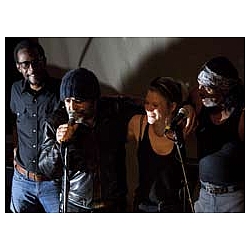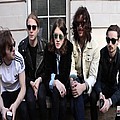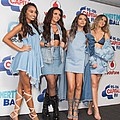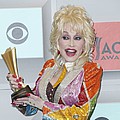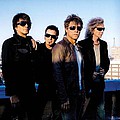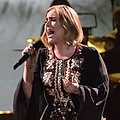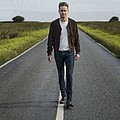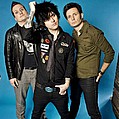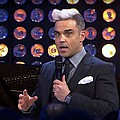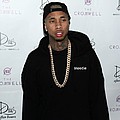Black Dub need to be felt as much as they need to be heard.
With their self-titled debut [in stores November 2nd], the group summon a sound that wouldn't be out of place over Twin Peaks or any other David Lynch work, for that matter. That sound sizzles from Trixie Whitley's smoky femme fatale croon, Daniel Lanois's intriguingly intricate fretwork and the mindblowing rhythm section of bassist Daryl Johnson [Neville Brothers, Emmylou Harris] and drummer Brian Blade [Wayne Shorter, Joshua Redman]. The album is a unique and undeniable combination of jazz, rock, dub and downtempo. Lanois's resume speaks for itself—the man produced U2's The Joshua Tree—but Black Dub is in a league of its own. Ultimately, this is one of the best debuts of 2010 and the start of something very special.
Black Dub vocalist Trixie Whitley talked to ARTISTdirect.com editor and Dolor author Rick Florino about the band's debut album, their chemistry and so much more in this exclusive interview…
Did you guys approach Black Dub with one complete vision for the whole album or did it come together in the studio?
For my part, it really came together in the studio. Daniel had already been working on the Black Dub idea and music for a long time, but the main puzzle pieces came together in the studio. I didn't really know what to expect exactly because I was such a new member. I had never worked with those guys before. It started off as an experiment, but Daniel had a very clear vision.
Your voice colors the music with some intriguing flourishes.
Thanks! We got really lucky in terms of the chemistry between band members. That's a very inspiring process, and it invites great things to happen. It was such a pleasure for me to work with Daniel, Darren and Brian. It was so inspiring that it was easy for me to sing on it.
Would you say there's a real boundless mentality behind the music?
Definitely! I don't really believe in any restrictions either way in anything. Horizons are very broad and limitless. I think that's a very powerful way of working. In terms of what we're all inspired by musically, it's a very eclectic mix of music. It's a beautiful thing to bring that all together and experiment. There's nothing more exciting in the creative process than to be able to experiment with a lot of different ingredients. That's how we want to work. The ideas we had were mutual. We were walking the same line and talking the same language in terms of where we wanted it to go sound-wise.
You struck something unique together.
It's something that doesn't happen very often. I'm super grateful for it, and I really believe that chemistry is the strength of this band. There's a real coherency but, at the same time, it's quite a challenging group of people. We're all so different and we come from such unique places. That's why we complement each other in our musical journeys though. I'm at the beginning of my journey next to someone like Daniel, who has been around in the music industry longer than I've been alive [Laughs].
Do you and Daniel have similar writing styles when it comes to lyrics?
Personally, I embrace more of the abstract ways of poetry. I like playing with words. I like imagery. I think Daniel comes from a different place. He's more of a storyteller than I am. He's more straight-up, but he still uses a lot of poetic elements. He leans closer to the folk world of songwriting and lyrics, whereas I'm more inspired by abstract images, words and immediate life experiences than storytelling.
What's the story behind "Love Lives?"
It's such a great song! Daniel wrote that. The chorus says, "I want to live where love lives." It's a theme that everyone can relate to in terms of searching for love and embracing it.
If you were to compare this album to a movie or combination of movies, what would you compare it to?
That's a good question! It'd probably be a science fiction film or something [Laughs]. When I listen to the record, it's so modern-sounding. There's this sonic territory it goes into, which I would probably visualize as a sci-fi film. Lyrically, it really comes back to the essence of human beings. It's very much soul food, which has nothing to do with modern technology. It's a combination of those two things. The power in the music and images comes from the fact that it's very raw at times, and it has a highly emotional impact. It's very human and it goes to a deep place. In terms of soul food and how we feed our souls has become a lost thing in our society. The imagery and lyrics are about very human aspects of life that I think modern technology can't really hit. That's only something you can achieve by creating fully out of your soul and your need to create. You can't think about it too much. It's a mix of something very modern and something emotional at the same time.
The human element comes through in the vocal delivery.
I really need to feel what I'm singing on an emotional level. That's how I create and where I come from. I got really lucky with this band that I was able to communicate my emotional feelings throughout the other people involved. It comes from the heart, both the dark side as well as the joyfulness of being alive. I have to be able to fully communicate every emotion I carry within me in my voice and my music. It comes from that way of looking at it.
Have you heard Black Dub yet?
Trixie Whitley news
